The Supreme Court is to hear 40 petitions seeking a review of its ruling that removed the age restriction on the entry of women to the Sabarimala temple November 13, 2018.
The restriction, it may be recalled, was for the age group of 10-50 years. In other words, menstruating women. As a matter sub-judice, none should question the merit of the judgement. However, the impact the September 28 judgement has had on the deemed-to-be developed society in Kerala calls for discussion. What the judgement did in its immediate aftermath was to sharply polarise opinions. Feminists in particular hailed the ruling as one that cemented gender equality. Groups such as one led by activist Trupti Desai, who had led women into the Shani Shingnapur shrine in Maharashtra following a similar verdict delivered by the apex court, have announced that they are getting ready to make their trip to Sabarimala during the Mandala season to stake claim on the right which the Supreme Court has reaffirmed for them.
Her earlier pronouncements were greeted with abuse and threats from the violent mass of Ayyappa believers in Kerala. The sentiments against ‘feminichis’ (feminists) such as Desai were vocalised by the likes of actor Kollam Thulasi when he said the bodies of such activists must be torn in half and a half each must be sent to the power centre in Delhi and the other half to the chamber of Chief Minister Pinarayi Vijayan.
In the grand drama that has seen Kerala being held on the edge of a precipice, political parties Right, Left and Centre have managed to ensure for themselves some space in the hearts of at least some sections of the society. They also believe that the issue is polarising enough to deliver them some benefits at the ballot. Kerala easily forgot the pain and suffering that the debilitating floods just a couple of months earlier had wrought upon it. It is still unclear what quantum of funds flowed into the coffers of the government and how much of it has been utilised for rebuilding the state.
The chief minister went abroad while the Sabarimala issue was raging in the state, fuelled by the political ambitions of the BJP-RSS and catalysed by the support of the Congress, both of which smelt an opportunity in the crisis once it appeared to gain critical mass. In the process, the religious sentiments of a segment of Ayyappa believers has been battered and bruised. Those that were teetering on the brink of belief remain undecided as to whether it is acceptable to alter the practice or not. Although the first set of five days after the judgement and then the two days later, on which the temple remained open, saw no woman of the restricted age entering, there is a mass building up for the Mandala season when the number of women of restricted age coming to the shrine is set to increase exponentially going by the 500 plus registrations for darshan made online. Even as Kerala is grappling with the question whether women will enter the temple or not, one other question that is being ignored is whether the entry of women of the restricted age to the temple will in any way help gender equality. Feminists tend to view temples as symbols of patriarchy that need to be wiped out.
But while they are seeking entry into such spaces in the name of equality, what they are ignoring is that they are in another way reaffirming patriarchy. It is questionable whether by allowing women into spaces that have stood as failed models, women will actually achieve anything progressive. The women who are going to enter the temple will only reaffirm the practice and lead a new segment of believers into the same old pattern of religion. Women gearing up to enter Sabarimala merely to prove that they should be treated as equals to men, would do well to stand back and look at their action dispassionately. How progressive will their action be considered a century later? What positive change will it bring about? It is quite possible that after the ‘outsiders’ with their liberal views grow tired of the issue and return home, the local masculinity may clamp down even more aggressively and reassert its hegemony with more vigour.
In the long run, such religious issues only help in pulling society backward, never forward. Such movements may help individuals gain temporary fame but could certainly damage local womankind permanently. Sometimes, it may be wise to ignore and bypass irritating religious norms and allow them to die a natural death over time. All modern thinkers must try to encourage the growth of scientific thinking instead of religion based thought processes for a better future of our youth.
